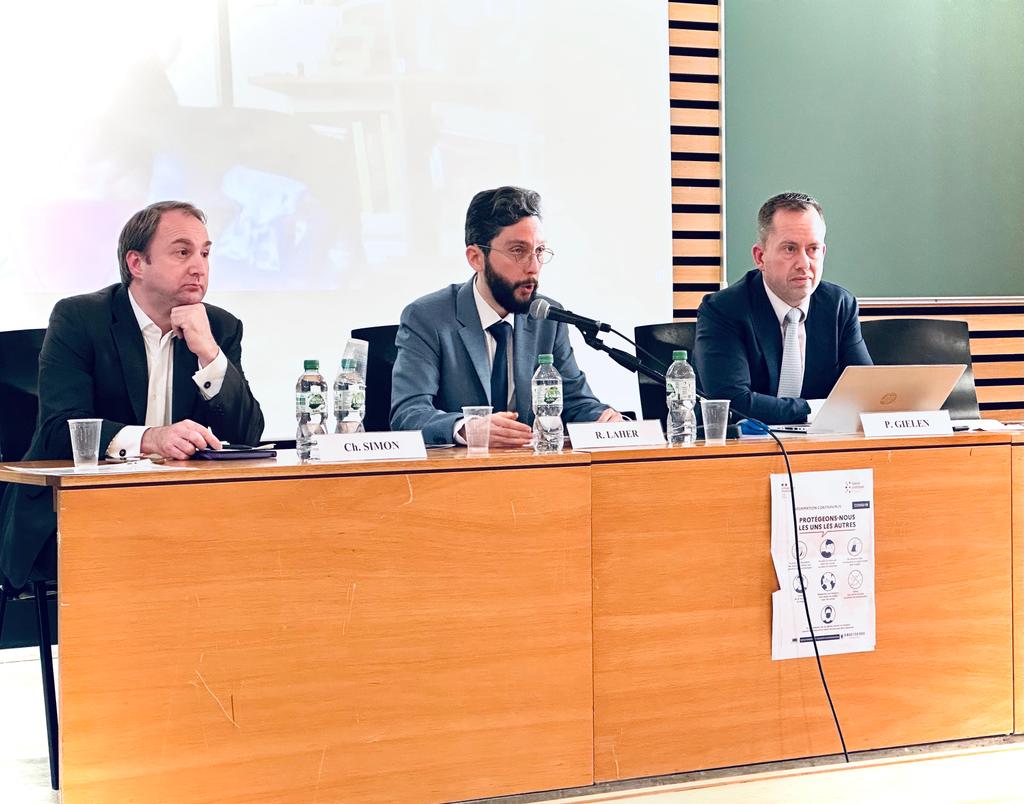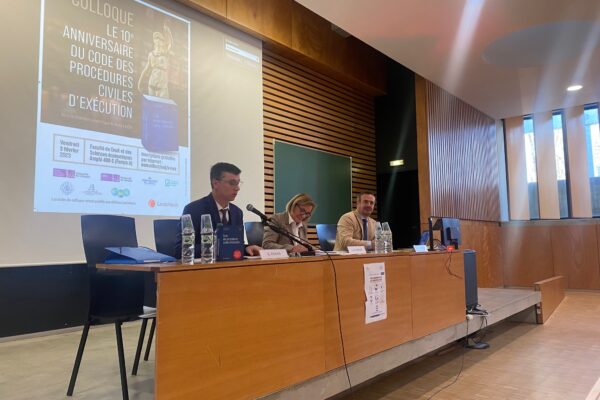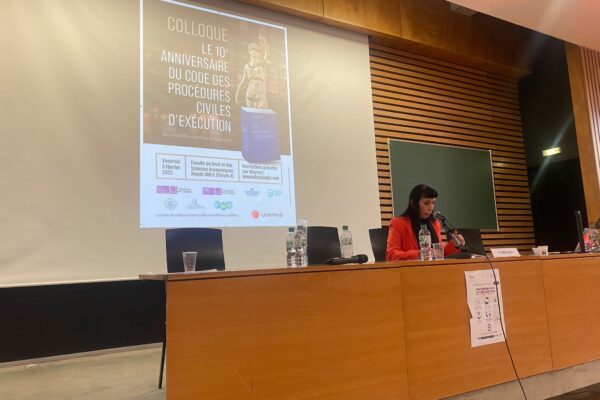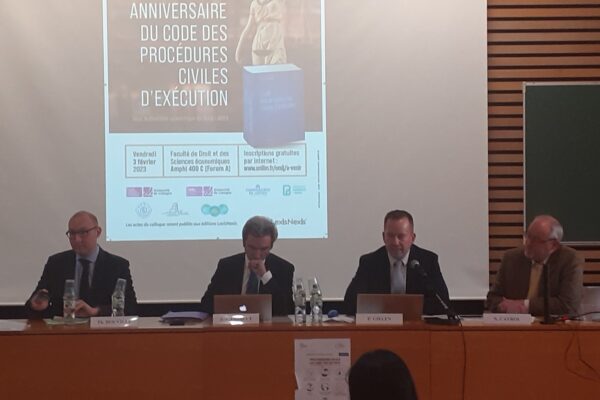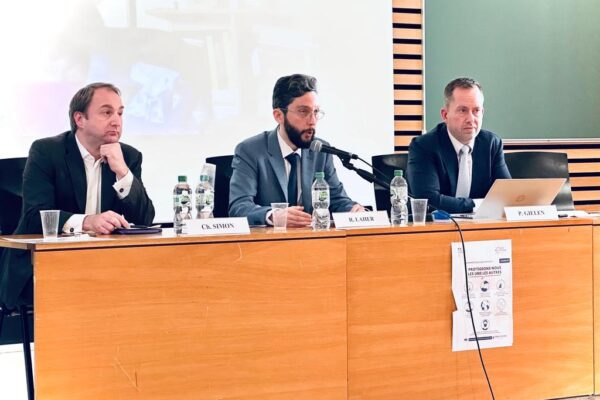The UIHJ, represented by Patrick Gielen, Secretary of the Board, participated on 3 February 2023 in the colloquium on the 10th anniversary of the French Code of Civil Enforcement Procedures organised by the University of Limoges (France).
Hélène Pauliat, director of the Observatory of Institutional and Legal Changes (OMIJ) at the University of Limoges, opened the conference by highlighting the importance of comparing perspectives between academics and legal professionals, to mix theory and practice. Rudy Laher, professor at the University of Limoges, went on to say that the times in which we live have changed a lot. 10 years ago, furniture was still worth something and crypto currencies did not exist… He wondered whether the Code of Civil Enforcement Procedures was adapted to the 21st Century. Finally, to close the opening of the colloquium, Christophe Pélissier, member of the National Chamber of Commissioners of Justice of France, highlighted the importance and the need to strengthen the training it provides.
The first part addressed the general provisions of the Code of Civil Enforcement Procedures. After an introduction by President Isabelle Vendryes, adviser to the Court of Cassation, Gaëtan Guerlin, professor at the University of Lille, developed the concept of enforceable titles and their variety, by reporting on the current process of “dejudicialisation” as regards obtaining legal titles and the emergence of the “deformalisation” of enforceable titles.
Guillaume Payan, professor at the University of Toulon, member of the Scientific Council of the UIHJ, then mentioned the strengthening of enforcement immunities, mentioning internal and international immunities, justified by the need for the continuity of the public service. He emphasised on the constant evolution of this matter and raised the importance in this area of respecting the European Convention on Human Rights.
Ludovic Auvergnat, commissioner of justice, explained in turn the functions of “unseizability”, noting the evolution of this notion. He presented the various existing “unseizabilities” and their various influences on civil enforcement proceedings. The commissioner of justice is at the centre of civil enforcement procedures. He is the local professional who knows what the debtor needs to survive, this under the supervision of the judge.
Cyril Roth, enforcement judge, addressed the topic of the autonomy of enforcement litigation. The execution judge is the natural judge to solve these issues. He highlighted the problems of management and rationalisation existing within the court. For him, the existing controls in the attachment procedures on salaries by the enforcement judge result mainly from the mistrust of commissioners of justice.
Sylvian Dorol, commissioner of justice, shared his knowledge on the impasses of the search for information. The right to information is actual but not absolute. It is limited and framed to certain information which can only be used for the case for which it was requested. He also pointed the lack of training of the commissioner of justice on this subject. Even if information exists, it is sometimes difficult to analyse it.
The second part, concerning the specific procedures and the digitisation of the procedure, was chaired by Patrick Gielen, who was able to give a brief overview of the UIHJ.
Nicolas Cayrol, professor at the University of Tours, discussed the diversity of seizures of monetary claims. There are indeed a multitude of different procedures, the attachment seizure being one of the most used procedures in France.
Thibault Douville, professor at the University of Caen, presented the prospective subject of the seizure of connected objects. The problem is that these objects have several characteristics. They are in fact tangible movable properties comprising an information system allowing the processing and/or storage of data, connected to a network. This triple characteristic is indeed likely to pose some problems for the commissioner of justice when seizing them.
Jean-Jacques Ansault, professor at the University of Paris II, went even further by highlighting the problem of the seizure of digital assets. Indeed, on top of the issue of the actual seizure of these intangible assets, is the issue of their location.
Anne Leborgne, professor emeritus of the University of Aix-Marseille, insisted, for her part, on the seizure of real estate and the question of its “dejudicialisation”, of which she is not in favour, highlighting the need for modernisation of the procedure.
Rudy Laher analysed in depth the eviction procedure which can last in France between 2 and 4 years and which requires a profound reform to strike a balance between the owner on the one hand and the tenant on the other.
Finally, Charles Simon, lawyer, spoke about the plasticity of provisional measures which allow, unlike enforcement procedures, to obtain from the enforcement judge a certain latitude in the requests relating to these measures. In addition, he underlined the importance for France of drawing inspiration from Belgium and more particularly from the Centralised file of notices of seizure, allowing the judicial officer to be able to carry out a solvency analysis prior to any enforcement.
Natalie Fricero, professor at the University Côte d’Azur, member of the Superior Council of the Judiciary and member of the Scientific Council of the UIHJ, made the concluding remarks of this interesting day by highlighting the evolutions of the Code of Civil Enforcement Procedures, while emphasising the importance of following these developments to adapt to the digital world.

